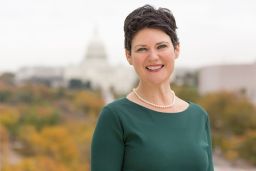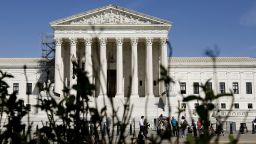Editor’s Note: Amanda?Tyler?is the lead organizer of?Christians Against Christian Nationalism. The views expressed in this commentary are her own. Read?more opinion?at CNN.
A new Texas law?allows public schools to replace counselors with chaplains and to use funds earmarked for school safety and mental health to pay them. The law went into effect this month.

Each of Texas’ more than 1,000 school districts?now has six months?to vote on whether or not to create chaplain programs. There are?no requirements to be called a “chaplain”?outside of passing a background check. People allowed to serve as chaplains in this program?are not barred from proselytizing?and?do not have?to have any chaplaincy training or expertise in working with children or people from different faith traditions.
“Chaplains represent God in government and are already extremely successful in helping our first responders, military, providing support in hospitals, and counseling in our prison systems,” Republican state Sen. Mayes Middleton from Galveston?wrote?about his motivation in authoring the legislation. “I believe that chaplains will greatly benefit our school students, teachers, and other school district staff.?Our schools are not God-free zones.”
As a constitutional lawyer and Baptist leader committed to religious liberty, I couldn’t disagree more. The very premise that the government plays a role in religious affairs betrays the foundational values of religious freedom.
Students are free to exercise their religion in ways that do not interfere with classroom instruction, but the school itself should not be in the business of propping up or denigrating anyone’s religion. While there are good reasons for chaplains in certain settings where someone cannot freely access religious services, those circumstances are not present in the public school context.
But, more personally, as the parent of a child in a Texas elementary school, I have deep concerns about any move to religious indoctrination or instruction in the public schools. My husband, who is Jewish, and I are raising our son in an interfaith household. My son sits in the pew with me for worship most Sunday mornings at our Baptist church, and we’ll soon celebrate the Jewish holidays together with our extended family at our Reform temple.
He is able to access both religious traditions as he develops his own sense of what it means to be human, and whatever questions my husband and I can’t answer, we have a rich community of clergy and lay leaders to help in his religious education.
To me, this is the essence of what flourishing religious freedom means, free of government interference. I don’t want government chaplains inserting themselves into my family’s?—?or any family’s?—?religious discernment.
Texas chaplains have voiced their strong opposition to this new law.?More than 100 signed an open letter?to the state’s school districts calling on them to reject this chaplain program.
“Government-sanctioned chaplains make sense in some settings, but not in our public schools,” states the letter, which is organized by BJC, Texas Impact and Interfaith Alliance. “Many of us serve in contexts in which individuals cannot access their religious services — such as the military, a prison, or hospital — which is hardly the case for children in public school. … Parents or guardians must have the right to choose the religious leaders who will influence their children’s spiritual journey.”
The Texas chaplains?specifically stated?that they “are not qualified for the duties envisioned by SB 763.
“We cooperate with mental health counselors?—?we do not compete with them. Further, professions which help children with sensitive matters, such as therapists and police investigators, typically require special training on how to interview and treat juveniles.” They also explain that “[c]haplaincy programs do not train chaplains on active shooter situations or to be public safety professionals.”
Texas recently required public schools?to display “In God We Trust” posters?if they are donated to the school. Another piece of legislation aimed to mandate the posting of the Ten Commandments in public school classrooms in the state. Fortunately,?the bill?died?after the Texas House didn’t meet a deadline to act on it.
While the Ten Commandments are central teachings in both Judaism and Christianity, there are?diverse texts and interpretations?in both faiths and among different Christian denominations. Teaching and talking about the Ten Commandments should be up to my family and the religious leaders at the church and synagogue where my family worships. The state of Texas should not control how my son learns about how, when, or if to worship God.
Texas parents who are Christian, Jewish, another religion or not religious should be able to unite across ideological differences to keep the government out of religious indoctrination and proselytization. It’s not a conservative or liberal position to believe that houses of worship and other religious institutions are better equipped than the government to teach children about religion.
My opposition to this and other forms of government-sponsored religion in schools is also rooted in my own Baptist faith. Baptists should be the loudest defenders of church-state separation –?historically, we have been.
The organization I lead, Baptist Joint Committee for Religious Liberty (BJC), has?worked for 87 years?to defend religious freedom for all. We?file friend-of-the-court?briefs?at the US Supreme Court,?lead coalitions to pass legislation?such as the?Religious Freedom Restoration Act, and advocate for federal agencies to uphold religious freedom through their regulatory agendas. Our work is rooted in the First Amendment’s guarantee of religious freedom and our Baptist conviction of “soul freedom.”
Soul freedom means that each individual is free to deal personally with God. Our direct relationship with God is an individual right and responsibility, and there should be no political interference with faith. Texas is increasingly getting in the way of soul freedom.
Get Our Free Weekly Newsletter
- Sign up for CNN Opinion’s newsletter
- Join us on Twitter and Facebook
It’s not just Texans who should be concerned. A public school chaplain law is being?pushed in Ohio, and one was proposed earlier this year?in Oklahoma. At least a dozen other states (Arkansas, Florida,?Idaho,?Kentucky, Louisiana,?Mississippi,?Ohio,?South Carolina,?South Dakota,?Tennessee,?Utah, and Virginia) require schools to display “In God We Trust.”
These efforts are part of a resurgence of Christian nationalism, the political ideology that conflates American and Christian identities. BJC launched the?Christians Against Christian Nationalism?campaign in 2019 to specifically call out the ways Christian nationalism distorts our faith and to make sure Christian nationalism doesn’t go unchallenged in the public square or our churches.?More than 35,000 Christians?across the country have already signed our statement of principles.
This increase in state-based attacks on church-state separation have been emboldened by the US Supreme Court’s?recent?decisions?that opened the door to more government meddling in religious affairs. During the 2021-2022 term alone, the Court?sided with a public school football coach?who had a history of leading post-game prayers with the team and decided that Maine?cannot exclude religious schools from a tuition assistance program.
As challenging as the circumstances are in Texas and many other places across the country, we can’t give up on the American experiment in secular democracy?—?one that allows all faiths to flourish by guaranteeing equal citizenship without regard to religion. Christian nationalism is a powerful ideology in a majority-Christian nation. But I’m hopeful that most Americans?—?of all faiths and of no faith?—?do not want the government deciding religious matters for our families.


